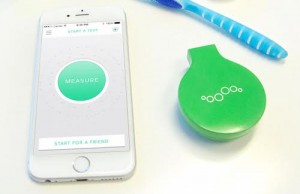 The Breathometer Mint, announced at CES.
The Breathometer Mint, announced at CES.
As mobile health continues to push more and more point of care diagnostics into the home, scientists are also finding new diagnostic modalities to spot diseases early. One of the hardest-to-believe is disease detection by smell, but it's proven effective in numerous studies published in the last few years.
Early proofs of concept came out of studies with dogs, which have been able to sniff out prostate cancer, for instance, with 98 percent accuracy. But more practical than a cancer-sniffing dog would be an electronic nose, a sensor that isolates and identifies smell-producing molecules in a patient's breath or urine. A number of researchers are working on projects along those lines.
One group working on this technology, a consortium headed by Professor Hossam Haick of the Technion-Israel Institute of Technology, is now talking about integrating an electronic nose with a smartphone to potentially allow for early diagnosis of numerous diseases with a quick breath test. Called the SniffPhone project, it's supported by a $6.8 million grant from the European Commission.
"The SniffPhone is a winning solution. It will be made tinier and cheaper than disease detection solutions currently, consume little power, and most importantly, it will enable immediate and early diagnosis that is both accurate and non-invasive," Haick said in a statement. "Early diagnosis can save lives, particularly in life-threatening diseases such as cancer."
Haick has been working on the sensor component since 2006. The consortium is made up of universities and research groups from Germany, Latvia, Austria, Finland, and Ireland, as well as the corporations Siemens and NanoVation-GS in Israel.
SniffPhone might be just a research project right now, but big backers are lining up behind similar technology here in the US, too. Mark Cuban-backed Breathometer started out as a smartphone-connect breathalyzer, but announced an oral health and hydration sensor at CES. The company mention cancer as an eventual target in an email to MobiHealthNews a few years ago.
"Our device currently detects ethanol/alcohol, [and] while others are solely focused on only that, we’re creating a multi-sensor breath analysis platform to truly maximize the digital health potential Breathometer has,” Breathometer CEO Charles Michael Yim wrote at the time. “Envision doing a doctor check up via your smartphone at home with a simple breath diagnosis verifying your sickness and having antibiotics delivered to your door. Our next version of the Breathometer device can detect halitosis, dehydration, [or] bad breath, and your metabolic rate through acetone. The end goal is pathogens, allergens, diabetes and potentially even cancer.”
The early days of mobile health were about developing mobile, smartphone-connected versions of existing diagnostic devices. But as we move forward, we might well see more examples of brand-new point-of-care diagnostic technology rolling directly out to smartphones.














